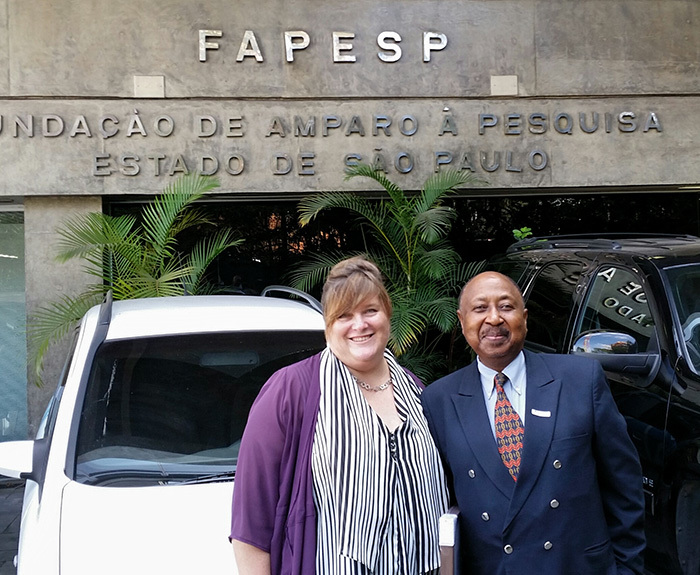Brazilian contracts pave way for South-South collaboration
10 September 2014 | Story by Newsroom
A formal agreement between UCT and the São Paolo Research Foundation (FAPESP) will result in scientific and technological cooperation between UCT researchers and their counterparts in the state of São Paulo, Brazil.
A public foundation, FAPESP is funded by São Paulo state taxes with the mission to support research projects in higher education and research institutions. Besides funding research in all fields, the foundation also supports large research programmes in biodiversity, bioenergy, global climate change, and neuroscience.
Professor Thandabantu Nhlapo, UCT's deputy vice-chancellor responsible for internationalisation, and Lara Dunwell, UCT's International Academic Programme Office's manager of mobility, partnerships and programmes, visited Brazil in late August to cement relationships developed during a visit by a larger UCT delegation a year ago.
Signed at FAPESP's São Paulo headquarters in late August, the recent agreement commits the organisations to scientific and technological cooperation through the funding of joint research projects. In preparation, seminars and workshops will be held to explore possible linkages and collaborations, a joint steering committee will be established, and a call for proposals will be issued.
On signing the agreement, FAPESP president, Professor Celso Lafer, emphasised his organisation's strong commitment to international collaboration in research. He said FAPESP was delighted to be working closely with UCT and added that funding would be available to support mobility for both researchers and graduate students.
The agreement unlocks significant opportunities for UCT researchers to strengthen links with their counterparts in São Paulo state, especially in areas of common research interest, including cities and urbanisation, renewable energy and climate change, environmental humanities, and physics and public health, and is of tremendous potential benefit to UCT, said Nhlapo.
Nhlapo believes the FAPESP-UCT agreement is an excellent example of South-South cooperation. "Our strategic goal is to enhance partnerships with countries which face challenges similar to ours, as is the case in Brazil. We have the same interests in questions around the organisation and sustainability of large cities, food security and marine biology," he said.
While in Brazil, Nhlapo and Dunwell took the opportunity to visit existing and potential research partners, dropping in at the BRICS Policy Centre, at the Pontifical Catholic University of Rio (PUC-Rio); the Palmares Cultural Foundation; the São Paulo State University; and the University of São Paulo.
UCT's current links with the BRICS Policy Centre are in the area of political studies. Among the terms of the new partnership with its parent institution, Pontifical Catholic University of Rio de Janeiro, the agreement highlights an exchange programme for undergraduates and graduates and cooperation in scientific research and projects involving both universities as well as the BRICS Centre for Studies and Research. "It currently has a call open for visiting scholars and welcomes applications from UCT," explained Dunwell.
The UCT delegation also met with the head of the Palmares Cultural Foundation, whose work focuses on Afro-Brazilian heritage. Plans for collaborative work regarding slave histories in Brazil and Cape Town are afoot and a Palmares delegation is due to participate in a conference in Cape Town in partnership with Iziko Museums and the Slave Lodge later this month.
Nhlapo and Dunwell visited the São Paulo State University (UNESP) '“ where physics researchers have already produced a publication with their UCT partners '“ as well as the University of São Paulo (USP), where an agreement was made to foster researcher and student mobility, as well as closer research collaboration.
"It is hoped that the agreement between UCT and FAPESP will further the development of the relationships between UCT, UNESP and USP, by unlocking the necessary research funding," Nhlapo concluded.
Image supplied.
 This work is licensed under a Creative Commons Attribution-NoDerivatives 4.0 International License.
This work is licensed under a Creative Commons Attribution-NoDerivatives 4.0 International License.
Please view the republishing articles page for more information.










